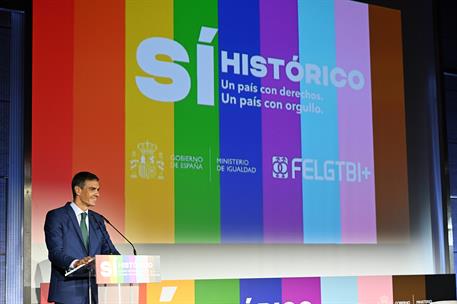The number of refugees in Spain on the basis of sexual orientation grows by 2.5% since 2022
News - 2025.6.27
The percentage of people who have been granted refugee status because of sexual orientation persecution in their country of origin has been growing steadily in recent years to 11.4% of refugees in our country. This is 2.5% more than in 2022, when the percentage was 8.9%.
"Spain is internationally recognised as a country that respects human rights and in particular the rights and freedoms of the LGBTQI+ community," said Minister Elma Saiz on International LGBTQI+ Pride Day. "It is something we should all be proud of, because it means that we are part of a diverse society that respects, welcomes and protects the persecuted, and that is not willing to take even one step back from the right to love and to be free.
In order to qualify for refugee status, membership of a "particular social group" must be recognised under the 1951 Refugee Convention, which defines the term 'refugee' and describes their rights and establishes the legal obligations of states to protect them. This is the case of people granted refugee status on grounds of sexual orientation, a number that has increased in recent decades around the world.
As for the refugees who enter the International Protection Reception System, Saiz specifies: "Being LGBTQI+ is not a vulnerability in itself, but when a person enters our international protection system we take their specific needs into account and follow the recommendations of the United Nations Refugee Agency (UNHCR) for this group."
Lesbian, gay, bisexual, transgender, intersex and gender-variant/trans people (LGBTQI+) seeking international protection face discrimination, persecution and violence, sometimes on a daily basis, in their countries of origin. In fact, according to the United Nations, in nearly 80 countries, discriminatory laws criminalise consensual private same-sex relationships, which can lead to arrest, prosecution, and imprisonment; in at least five countries, they can even carry the death penalty.
The Collective in the International Protection Reception System
In the system's Reception Centres, a series of specialised care measures are taken for applicants for international protection on grounds of persecution because of their sexual orientation or gender identity. Essentially, the aim is to create a safe and supportive environment and awareness-raising activities are carried out to achieve this. From the reception system access unit, it is valued that the allocation of places is carried out in safe environments that generate trust and security, facilitating the free expression of sexual orientation.
In addition, the newcomers are accompanied by trained staff with specific training. In addition, there is close collaboration in training, awareness-raising, documentation, etc., with various specialised organisations such as the Madrid LGTBI Information and Care Programme, the Catalan Association for the Integration of Homosexuals, Bisexuals and Transsexual Immigrants (ACATHI) and the Melilla Association of Lesbians, Gays, Transsexuals and Bisexuals (AMLEGA).
In addition, within the reception system, there is the participation of entities specialised in intervention with the group that develop specific actions such as, for example, the Project of Accompaniment in Intragender Violence of NGO Rescate. This project was born in January 2023 with the aim of providing support to LGBTQI+ migrants, applicants and beneficiaries of international protection who suffer, have suffered or are at risk of suffering intra-gender violence.
On the other hand, the Centres work with residents to avoid LGTBIphobia situations through group and individual sessions to promote respect and deconstruct prejudices towards the collective. In addition, specific information is provided on the protection that the legislation offers in cases of hate crimes and/or LGTBIphobia and on the consequences of such an act within the system.
"In Spain, the law guarantees the rights of LGBTQI+ people and seeks to eradicate situations of discrimination, in which much progress has been made in recent years," said Elma Saiz, "but in addition, Spanish society demonstrates a remarkable maturity in this matter, as shown by the fact that it has been 20 years since equal marriage was legalised; we were one of the first countries in the world. All this facilitates the coexistence and integration of people who come seeking refuge."
Global applications for international protection
Overall, in recent years, applications for international protection in Spain for all reasons have increased significantly, as can be seen in the "Report on the international protection system in Spain," published by the Ministry's State Secretariat for Migration.
In 2023, Spain recorded an all-time high of 163,220 applications for protection, 37% more than in 2022, when a total of 118,842 applications were registered. In 2024, the number of asylum applications was 2.5% higher than those registered in 2023, with a total of 167,366. So far in 2025, the Asylum and Refuge Office (ARO) of the Ministry of Home Affairs has registered nearly 65,000 applications, mostly from Venezuelan, Colombian and Peruvian nationals. The rest of the majority nationalities come from sub-Saharan Africa, mainly people from Mali, whose civil war has escalated in recent months.
Non official translation





